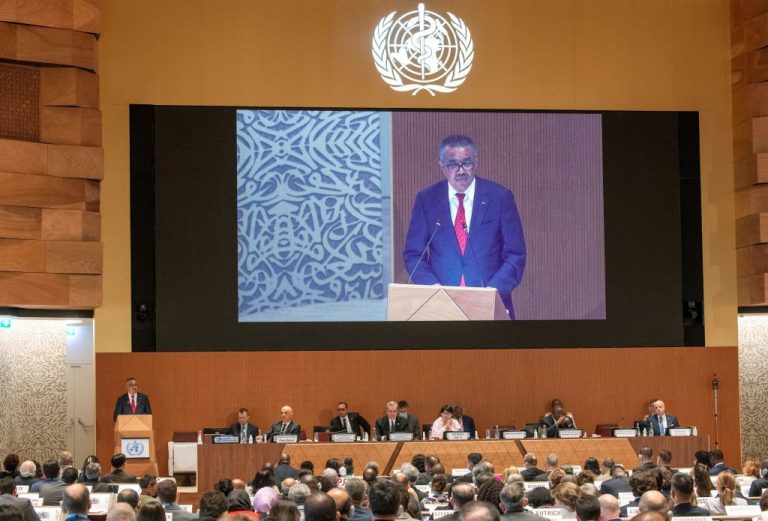Several nations rejected the Biden Administration’s proposed amendments to the World Health Organization (WHO) pandemic response plan last month, averting a near-total submission of national sovereignty to the Organization in the event of a pandemic.
“Brilliant news out of Geneva today!” Queensland, Australia representative Stephen Andrew cheered on his Facebook page after a Botswana representative on behalf of the African delegation on May 25 announced all members of the continent would pull out of the plan.
MORE ON PANDEMIC TREATY:
- WHO to Advance ‘Legally Binding’ Pandemic Controls Over Member States to Next Stage in July
- WHO Set to Become Centralized World Pandemic Policy Administrator
- WHO Pushing for ‘Legally Binding’ Agreement to Deploy ‘Whole-of-Society’ Pandemic Measures
- The Internet Hivemind Wants ‘Zero Monkeypox’ Policy Installed
The MP continued to explain how the World Health Assembly (WHA), a subset of the WHO, convened its annual meeting in Geneva, Switzerland, from May 22 to May 29 to outline U.S. President Joe Biden’s 13 controversial amendments to the International Health Regulations.
Total control
Biden’s proposals form a set of directives that would “regulate” the subsequent members’ response to an immediate health crisis, such as another virus outbreak.
The directives would have altogether bypassed national sovereignty in dealing with a declared health emergency and shifted total authority to a non-governmental body, the WHO.
Success
You are now signed up for our newsletter
Success
Check your email to complete sign up
Once installed, the Organization could overrule domestic emergency rulings and issue any quixotic measure it deems fit to counter invisible viral enemies.
These measures could include, but need not be limited to, imposing lockdowns, enforcing mask mandates, vaccination, or locking up individuals in quarantine facilities for an undetermined length of time.
Counter initiatives
“The first sign, however, that things might not be going the globalists’ way, came on Wednesday, the 25th of May, which just happened to also be Africa Day,” Andrew wrote.
“Botswana read a statement on behalf of its 47 AFRO members, saying they would be collectively withholding their support for the ‘reforms,’ which many African members were very concerned about,” he added.
As it turned out, other countries had their objections too. BRIC partners, Brasil, Russia, India, China and other countries like Iran, South Africa, and Malaysia also decided to opt-out.
“Brazil will not get into this [WHO Pandemic Treaty]. Brazil is autonomous,” President Jair Bolsonaro told reporters even before the meeting.
“National sovereignty is not something to be handed over to WHO or other entities and to be renounced just to join a club of seemingly advanced nations,” Bolsonaro said, who indicated a willingness to quit with the WHO on several occasions.
GOP Pushback in the US
Meanwhile in the U.S., several primarily Republican-led initiatives were taken to stop the WHO from what they consider governmental overreach.
One such initiative was the issuing of the No WHO Pandemic Preparedness Treaty Without Senate Approval Act, which Sen. Ron Johnson (R-WI) spearheaded along with 15 other GOP-affiliated sponsors.
The bill mentions the WHO creating an “intergovernmental negotiating body” (INB) to address health crises that would need a “whole-of-government” and “whole-of-society” approach.
After its formation, the Organization could spit out any emergency measure legally binding to all WHO member states.
The WHO cited “greater transparency” as justification for its far reaching proposal.
“The World Health Organization, along with our federal health agencies, failed miserably in its response to COVID-19. Its failure should not be rewarded with a new international treaty that would increase its power at the expense of American sovereignty. What the WHO does need is greater accountability and transparency,” Johnson told the Daily Caller, which first had access to the document.
“This bill makes clear to the Biden administration that any new WHO pandemic agreement must be deemed a treaty and submitted to the Senate for ratification. The sovereignty of the United States is not negotiable,” Johnson continued.
Butting Heads again in 2024
Whether the objection from different countries is sincere or whether it was simply provisional, we will find out in the not-too-far-away-future, for—as Andrew warned, referring to the WHO’s response to the repudiation:
“They have not given up though – far from it…Instead, they did what they always do and ‘pivoted.’”
“At their request, a new working group was convened to make ‘technical recommendations on the proposed amendments which will be re-submitted along with the Pandemic Treaty, at the 77th Health Assembly meeting in 2024.”


















